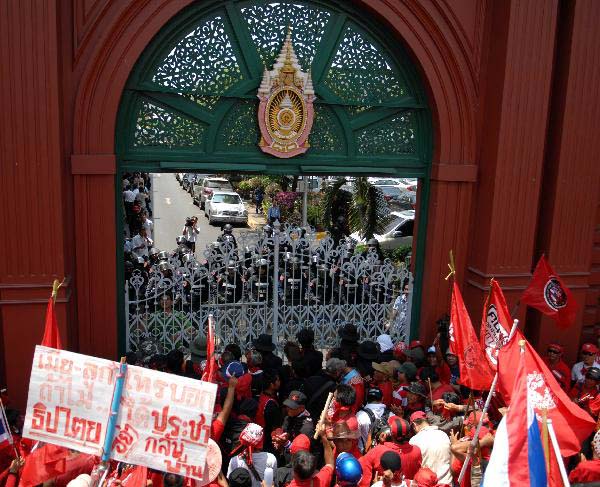Thai PM declares state of emergency in Bangkok
Thailand's Prime Minister Abhisit Vejjajiva declared a state of emergency in Bangkok and some areas of the nearby five provinces in a live TV address at about 6:00 p. m. Wednesday to deal with the ongoing anti-government rally by the "red-shirts".
He has assigned Deputy Prime Minister Suthep Thuagsuban to head the committee that handles the emergency situation, Ahbisit said, without disclosing how long the emergency decree will last.
The emergency decree takes effect immediately in and around Bangkok as well as the nearby provinces of Samut Prakan, Nonthaburi, Pathum Thani, Nakhon Pathom and Ayutthaya, he said.
Appearing on national television with members of the government 's Center for Administration of Peace and Order (CAPO), the Prime Minister said there are four reasons to declare a state of emergency: first is to restore normalcy; second, to stop the spreading of distorted information, which has led to social divisiveness; third, to conduct the legal procedure against the " red-shirts" leaders; forth, to stop the crimes and violence.
|
|
|
Thailand's red-shirted protesters confront with policemen and soldiers at the gate of the Parliament House compound in Bangkok, capital of Thailand, April 7, 2010. Hundreds of anti-government protesters besieged the Parliament House for hours Wednesday and stormed into the compound before they withdrew and dispersed upon their leader's request. [Xinhua] |
Thailand's Prime Minister Abhisit Vejjajiva declared a state of emergency in Bangkok and some areas of the nearby five provinces in a live TV address at about 6:00 p. m. Wednesday to deal with the ongoing anti-government rally by the "red-shirts".
He has assigned Deputy Prime Minister Suthep Thuagsuban to head the committee that handles the emergency situation, Ahbisit said, without disclosing how long the emergency decree will last.
The emergency decree takes effect immediately in and around Bangkok as well as the nearby provinces of Samut Prakan, Nonthaburi, Pathum Thani, Nakhon Pathom and Ayutthaya, he said.
Appearing on national television with members of the government 's Center for Administration of Peace and Order (CAPO), the Prime Minister said there are four reasons to declare a state of emergency: first is to restore normalcy; second, to stop the spreading of distorted information, which has led to social divisiveness; third, to conduct the legal procedure against the " red-shirts" leaders; forth, to stop the crimes and violence.
The emergency law is the tool for the government to improve efficiency when handling the current situation, he said.
"The law is not to suppress the people, and the government is going to follow international standard" while implementing the decree, he said.
Abhisit said the Internal Security Act, which has been enforced since the very beginning of the prolonged rally, is not enough to control the situation since the rally has turned unconstitutional and unlawful.
The "red-shirts" protesters do not abide by the law now, Abhisit said, especially during the past two days and their invasion of the parliament earlier the day.
Hundreds of "red-shirts" besieged the Parliament House for hours Wednesday and stormed into the compound before they withdrew and dispersed upon their leader's request.
Abhisit has announced earlier the day to cancel his trip to the U.S. on April 10 for the World Nuclear Conference after the chaos at Parliament House.
The anti-government movement has been staging a major rally since March 12 in Bangkok to pressure the Prime Minister to dissolve the parliament and hold a snap election.
 0
0 








Go to Forum >>0 Comments